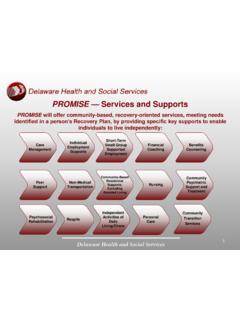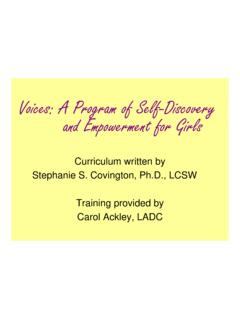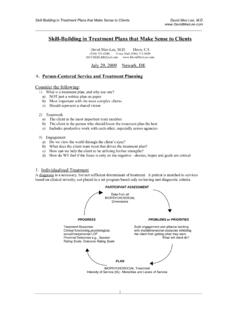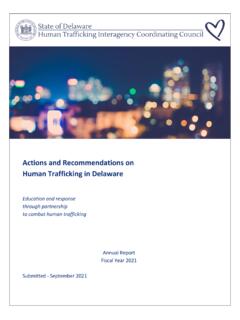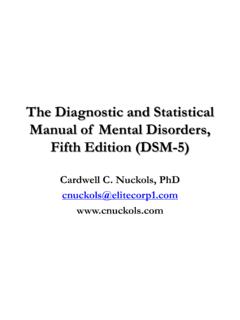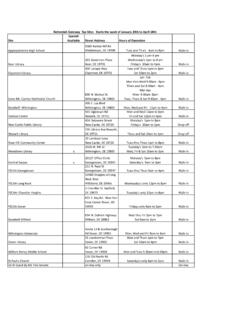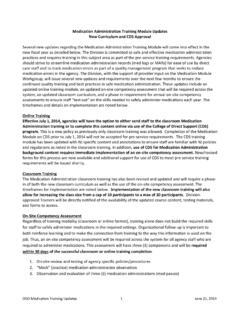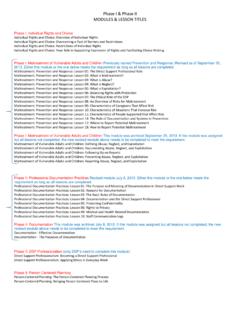Transcription of DELAWARE HEALTH AND SOCIAL SERVICES
1 DELAWARE HEALTH AND SOCIAL SERVICES . Office of Professional Development college of direct support Bulletin Spring 2015. Introduction: Friends, Colleagues and Disability Professionals, this is the Spring edition of the college of direct support (CDS) Bulletin, which the Office of Professional Development (OPD) is publishing at regular intervals to inform and educate CDS users regarding updates to the college of direct support , as well as to provide information regarding the DDDS Office of Professional Development. If you didn't already know, please note that the Training and Professional Development Unit or TAPD, has a new name. We are now the Office of Professional Development or OPD. The reason for the change is that with the modifications of our duties and responsibilities the focus of our mission will be to assist agencies and our internal customers with supporting and developing their talents to better serve those in the community who live with developmental disabilities.
2 Thanks again to all of you who are working so diligently with OPD to become comfortable with the CDS on-line training system. Since introducing the online training system in July of 2013, the agencies have enrolled over 4,300 learners, assigned 287,579 courses and completed 199,041. lessons. Please continue to provide DDDS with information about your training experience so we can further refine and improve the CDS Training System. Please remember to pass the Bulletin on to your staff. From time to time we receive a comment or question that was previously addressed in a recent Bulletin. The OPD is happy to address any question regarding the CDS or our Division, however, in order to have the time to work with all of you and address the needs of the community our time would be more efficiently used working on matters not already reviewed in this publication.
3 college of direct support Improves Life Outcomes for People with I/DD, Increases Staff Knowledge and Skills and Lowers Staff Turnover The college of direct support (CDS) is a set of web-based courses designed for direct support professionals (DSPs) and others who support individuals with disabilities. The courses have been adopted statewide in 14 states (CT, DE, KY, IA, KS, ME, MS, MN, MO, MT, NJ, OK, PA, VA). Providers of service in 34 states also use CDS and over 6,000,000 competency-based lessons designed to connect DSPs with a nationally recognized set of skills and a clear career path have been assigned to DSPs in these states. The CDS is also used internationally in Australia, Canada and Guam. Recently, CDS was part of a comprehensive training study funded by the National Institute on Disability and Rehabilitation Research (NIDRR).
4 The one-year intervention used in the study included: 35 lessons from direct Course: college of direct support , Group discussion with peers and supervisors, and Mentoring by supervisors or advanced DSPs. The CDS lessons were organized into six modules that aligned with desired outcomes of people with IDD that were being served in the participating organizations. They included: 1. Satisfaction with staff 2. Community inclusion 3. Choices and rights 4. HEALTH and safety 5. Friends and family 6. Work 7. Day and home The study involved 11 participating provider organizations with 112 service locations (35. day programs; 77 residential) supporting 989 people. Also participating were 824 DSPs and 333 individuals receiving service who were randomly assigned to either a group that received the intervention or a group that did not.
5 Organizations received support to implement the CDS that included an average of 10 hours of in- person consultation over a three day period that focused on technology assessment, planning, organizational change needs, policy assessment, and supervisor preparation. Data was collected using: 1) site level surveys, 2) supervisor assessments of DSP skills, 3) DSP. surveys, 4) DSP training data, and 5) in-person interviews with people with developmental disabilities (using the National Core Indicators survey). Key Findings revealed were: Turnover was lower, Staff gained knowledge and skills, and people who received SERVICES had better outcomes. When controlling for wages, education and setting, the study found intervention sites reported significantly lower annual DSP turnover rates than the control group.
6 Specifically, the intervention sites were found to experience lower turnover rates than the control group. DSPs showed increased competency in both the control and intervention sites, though the intervention sites showed twice the growth in competence of DSPs. This was more pronounced among newer staff. The outcome areas in which DSPs showed significant improvement in competence are Supporting Individual Rights and Choice, Supporting Individual HEALTH and Safety, and Supporting Relationships. DSPs who received the intervention also expressed greater satisfaction with their supervisor, a critical factor influencing turnover rates. Finally, and most importantly, the study shows that people with IDD who were supported by DSPs in the intervention group experienced significantly higher community inclusion, and were significantly more likely to see their family members when they chose, were more likely to exercise choice in their daily living activities, and reported higher scores when describing the types of relationships they have with friends and other community members.
7 This study is not the only evaluation that has been conducted related to CDS. There is a growing evidence base about its effectiveness. The University of Minnesota is currently conducting further analyses to look at differences in outcomes by setting type, and recently launched a new study looking at the effectiveness of CDS being used to train staff that support people with IDD. in their own home or in family homes. The connection between the CDS and NCI outcome data certainly can provide states with viable solutions to improve outcomes in areas where improvements need to be made in states. Specific targeted lessons from CDS can be assigned to direct support professionals and others involved in day-to-day implementation and support . Key State Implementation Strategies include: 1) Conducting a cross walk between state-required training, the state vision of SERVICES and supports, and the values of a state system with CDS.
8 2) Aligning CDS curriculum (and embedded learning objectives) with state initiatives and priorities ( person centered thinking and planning, positive behavior support , community living, HEALTH and wellness). 3) Developing broad communication strategies to raise awareness of how the use of CDS. can meet state requirements but go beyond to improve quality of SERVICES . 4) Ensuring access to all public and private providers. 5) Communicate common expectations within states and MCOs to train direct support , supervisor, and management staff on the competencies identified in CDS. 6) Using collaborative cross-sector purchase of the direct Course suite of curriculum to decrease costs and promote broader utilization. 7) Ensuring evaluation implementation regarding the use of CDS that includes: utilization, costs, improved quality of supports and other quality of life indicators to share evaluation results with various stakeholders.
9 FMI: To learn more about direct course evaluation briefs go to: DELAWARE Training Module Updates: 1. G - Clinical Module A and B have been renamed Program Coordinators / Case Managers Modules This change was made in order to more accurately reflect the staff that performs the work the training module was designed to address. Please also note that the Clinical Modules have also been renamed. Any Learners currently enrolled in the Clinical Modules will automatically be enrolled in the Program Coordinators / Case Managers Modules. 2. New Dementia Training Module: Following requests from several agencies, DDDS recently acquired access to the college of direct support 's newest Dementia Training module. Please look for this module in the upcoming days. The Dementia module will be available to all agencies participating in the college of direct support and includes 27 lessons that address different aspects of supporting and working with aging individuals with developmental disabilities who are also experiencing dementia.
10 At this time this module is optional for agencies, however the modules or certain lessons may become mandatory in the future. Archive and Reassignment Process: Continue to make your requests' directly to Elsevier in order to archive and reassign training modules until April 29th. The issue regarding this procedure and your ability to do this process unilaterally within the college of direct support is to be completed by that time. If OPD. becomes aware of any changes to this schedule we will pass that information on to you immediately. Permission to Share Requests (PTS) Updated Process: An agency that needs to register a learner that has already been registered by another agency and has a learner ID should make a request to DDDS' Carl Wexler at using the Permission to Share My CDS Transcript form.
